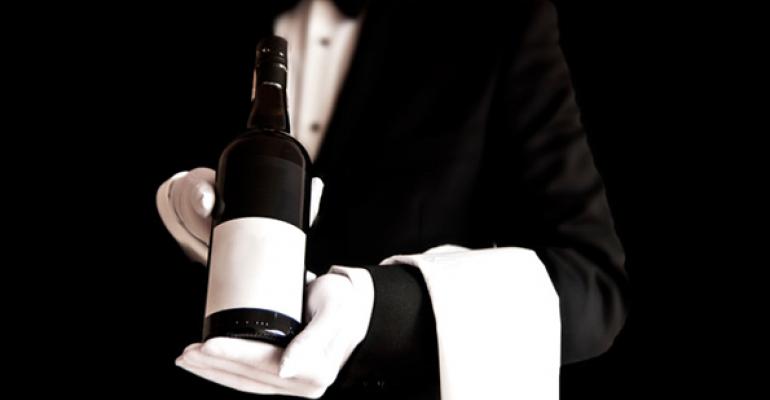
Wine and Shakespeare have a lot in common. They both have incredibly long histories and hold places of esteem in many cultures. But while most people have an inherent respect for each of them, they’re also intimated by them and, if push came to shove, couldn't really articulate what makes each so darn special. So if an actor, or a retail salesman, or a sommelier, can bring the prose to life, or pop a special bottle that’s perfect for the occasion, they’ll find they have an eager audience.
Ruffs and tights aside, one of the best ways to sell an obscure bottle of wine, or a strange beer from a faraway land, is by channeling your inner actor to bring the tales behind the bottles to life. For we in the hospitality business have an opportunity to become storytellers, and in so doing we can take guests on unexpected journeys — and certainly drop more money to the bottom line.
The beverage world is made up of myriad characters (just like a great Shakespearean play) with fascinatingly different backgrounds, often rich in heritage and tradition. It takes a certain type of person who can devote one’s life to the production of craft beverages — someone who dedicates vast amounts of time, care and energy to bring those beverages to your table.
A bottle of wine, for instance, is much more than fermented grape juice; it is a snapshot in time, with many layers to explore. In that bottle lies history, science, geography and often thought-provoking techniques to explore. A good beverage team, through research and constant training, can empower their staffs to hit the floor with passion and enthusiasm to share their knowledge with their guests, just like a well-rehearsed actor does the stage.
Yes, one can certainly sell beverages by simply talking about their flavor profiles, tannic structures, acidity levels or mouth feels. (Let’s be honest, the vast majority of beverages are sold this way, and in a lot of cases by people with zero understanding of what they’re actually pouring.) These descriptions have become a common language to help guests find what best fits their taste. So they’re necessary, but by going a step further and showcasing the people behind their production, or talking about the cultures from which these bottles sprung, that's when things can get really interesting — for that's where their life truly lies.
If one can tell you a wine is light bodied and high in acid, but also that it was made by a man whose vineyard lies in a war zone, and in this particular vintage, he chose to stay and harvest his grapes while all of his neighbors ran for safety, your appreciation instantly begins to deepen. While that wine dances across your palate, your imagination will run through foreign lands, and you’ll hopefully have an experience that won't soon be forgotten. And in today's business climate of extreme competition, you can't afford to let your guests just drift through your four walls.
Employ storytelling deftly
(Continued from page 1)
We've all had hundreds, if not thousands, of forgettable beverage experiences, but those that make a real impression on us are those for which we’re given some sort of context to appreciate them in. That goes for a cup of coffee made with beans from a tiny farm in the hinterlands of Guatemala, or a pot of tea brewed with leaves gathered from the precipices of cliffs. At the heart of these transcending experiences is education. And to learn, we need good teachers to guide us — beverage sherpas, if you will, who can carry us to far off lands by illuminating just how they made their way to us.
The storytelling approach needs to be employed deftly, however. Your servers cannot be put into the role of monologist at each table, rattling on and on while guests’ eyes roll back in their head and their station descends into disorganized chaos. They frankly, don't have the time to do that, and most guests don’t come to a restaurant thinking they’ve booked front row seats for an "Intimate Night With the Artist."

What wine sales techniques have worked at your restaurant? Join the conversation in the comments below.
Just like menu speeches, which are often boiled down to their most important components and practiced ad nauseam, so, too, can your staff learn to talk about the selections on your beverage list with style and ease. A simple addition such as, "Interestingly, this beer was brewed by a young man in Tuscany who descended from many generations of winemakers. But he chose to break the mold and branch out in a new direction, and now finds himself at the forefront of Italy’s craft beer renaissance," is enough to give some context to help clinch the sale and allow them to better appreciate what’s in their glass. And for those patrons who wish to hear more, they can ask for it, and your team will be there, ready to indulge them.
Many operators are shy about purchasing big-ticket items for their wine list because they're afraid they won't sell. Well, the reality is they won’t, unless the staff is allowed the opportunity to learn their heritage, to taste them and perhaps even to meet the people behind the labels. The vast majority of beverages sold in our country are sold because of the recommendation of the retailer, the server or the sommelier. So if you can make a suggestion that the customer not only likes, but that also opens their eyes by educating them on what makes that bottle special, you’ve gone the extra mile, and you’ll find them knocking on your dressing room door again soon. More often than not, we owe it to the talented producers to learn their backgrounds. Some stories are just too special to remain untold.





